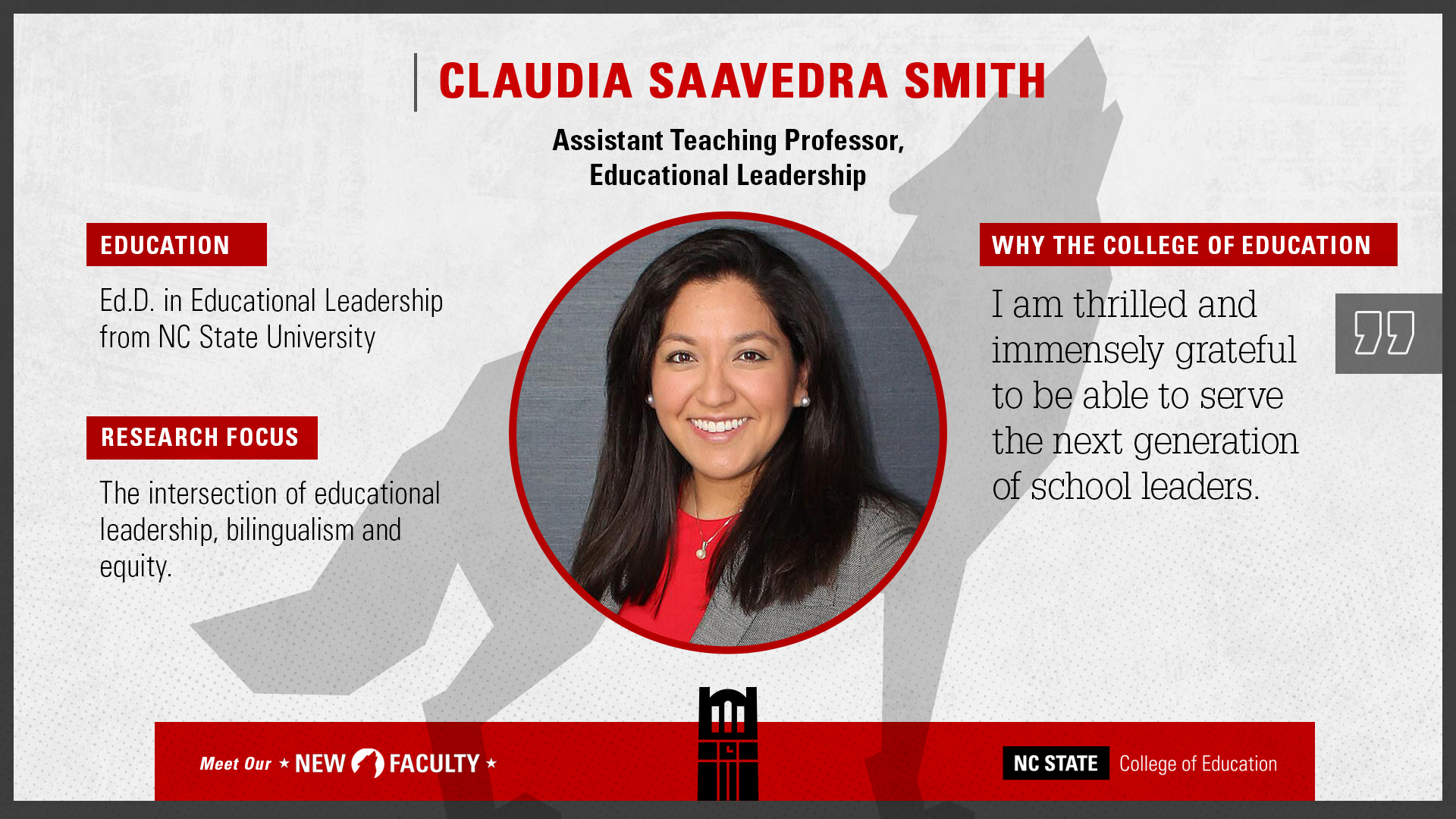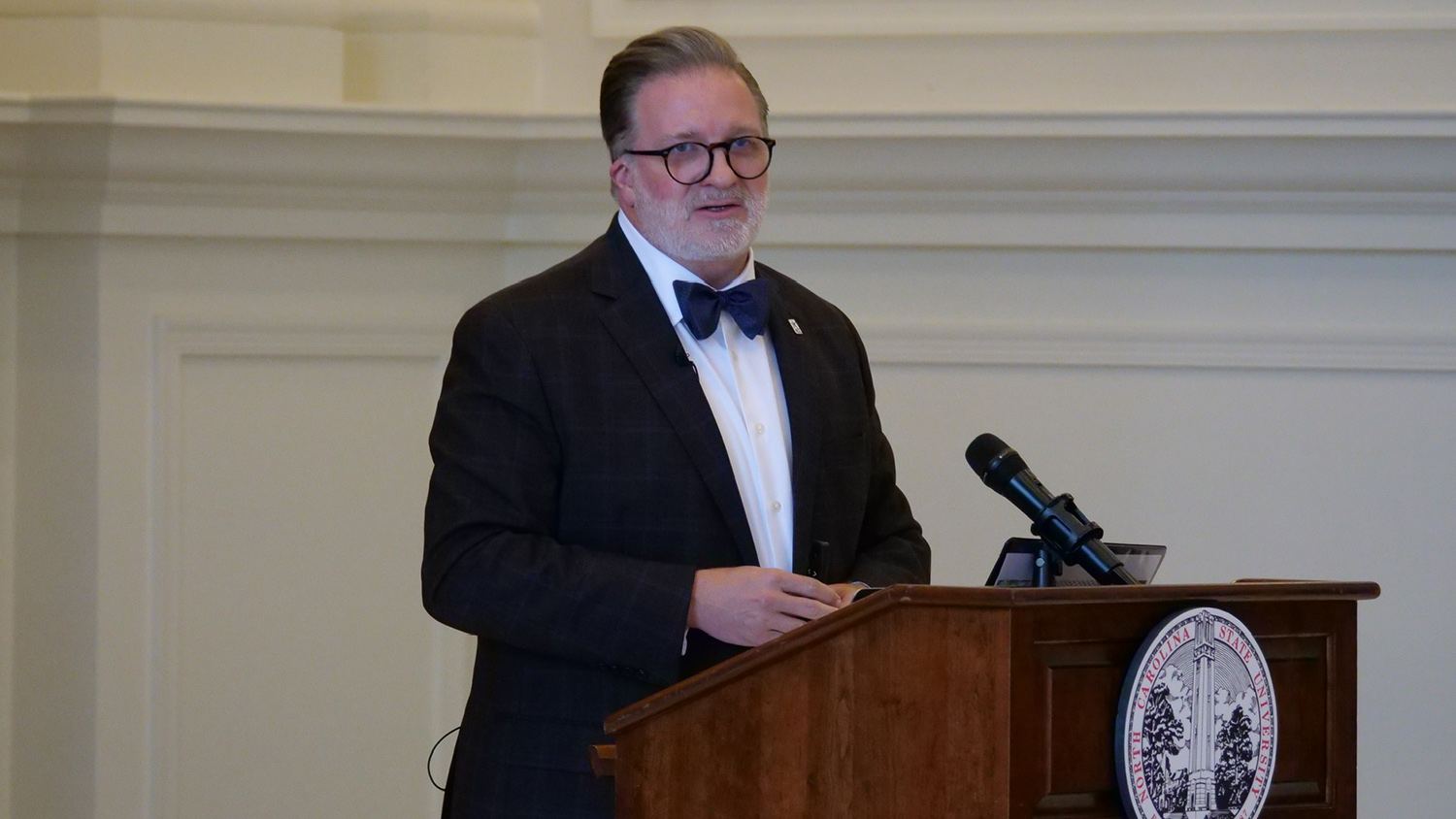Meet Claudia Saavedra Smith ’17MSA, ’24EDD: ‘I Hope My Students Will Come Away with a Deep-seated Love for Learning and a Recognition of Its Value’

Claudia Saavedra Smith ’17MSA, ’24EDD, a two-time alum of the NC State College of Education, will return to the college during the 2024-2025 academic year as an assistant teaching professor of educational leadership.
She previously served as a cohort director for the Red/Wake Cohort in the College of Education’s NC State Educational Leadership Academy (NELA). Her studies focus on ways effective leadership practices can drive change and innovation in schools as well as bilingual education and multilingual learners.
Learn more about Smith below:
The following Q&A has been edited for length and clarity.
Why did you choose a career in education?
Choosing a career in education for me was deeply influenced by my family background and personal experiences. My mom and grandmother were both teachers, and their passion for education left a lasting impact on me. Growing up, I saw firsthand the difference they made in their students’ lives, and that inspired me to follow in their footsteps.
However, my journey also highlighted the need for representation in the classroom. Having had very few teachers who looked like me, I felt a strong pull to be a role model and a source of inspiration for students who might not see themselves reflected in their educators. I wanted to help create an environment where all students could feel seen, understood and motivated to reach their full potential. Combining my family’s legacy with the desire to offer representation and support to students like me, I chose a career in education to make a meaningful impact and contribute to a more inclusive and equitable learning environment.
What inspired you to pursue a doctoral degree?
Pursuing a doctoral degree has always been a dream and goal of mine, driven by a deep-seated passion for learning and teaching. My time at NC State was particularly influential; I had the privilege of learning from incredible professors whose enthusiasm, expertise and dedication profoundly inspired me. Their ability to engage and challenge students ignited a desire in me to contribute to the academic community in a similar way. Witnessing their impact on students and the field motivated me to aim for a role where I could teach at the university level, shaping the next generation of scholars and professionals.
What sparked your interest in your areas of study?
My interest in educational leadership, bilingual education, multilingual learners and equity in education is deeply rooted in both my personal and professional experiences. Having spent almost my entire teaching career in a language immersion school, I witnessed firsthand the unique challenges and opportunities that come with bilingual and multilingual education. As a multilingual learner myself, growing up speaking Spanish at home while learning English and French in school, I have a personal understanding of the complexities and rewards associated with navigating multiple languages. These experiences have fueled my passion for exploring how effective educational leadership can enhance the learning environment for multilingual students. I’ve seen the profound impact that good leadership can have on creating supportive and inclusive school communities, which has further motivated me to delve into this area of research.
Additionally, my career has highlighted the importance of addressing equity in education. Observing the disparities that exist and striving to create more equitable learning opportunities for all students has become a driving force in my work. By combining my background as a multilingual learner with my professional insights into educational leadership and equity, I aim to contribute to developing practices and policies that support and empower every student, ensuring they have the resources and opportunities needed to succeed.
What is one moment or project in your academic career that you are particularly proud
of?
One moment in my academic career that I am particularly proud of is the development and implementation of a specialized training for our NC State Educational Leadership Academy (NELA) program called “Spanish for Educational Leaders.” This project involved creating a seven-session course designed to equip school leaders with essential Spanish-language skills and cultural understanding to better support Spanish-speaking families.
The training focuses on basic conversational Spanish, helping leaders practice introductory phrases and key communication strategies. It also emphasizes practical ways to make Spanish-speaking families feel welcomed, included and empowered within their school communities. The project not only addressed an immediate need for language support but also fostered a more inclusive and supportive environment for families who might otherwise feel marginalized. Seeing the positive impact this training has had on both future school leaders and the students and families they currently serve has been incredibly rewarding.
What is your teaching philosophy?
My teaching philosophy is rooted in the belief that all students have the capacity to learn and succeed when given the right support and opportunities. Central to this philosophy is a commitment to creating a student-centered learning environment where each student’s unique needs and strengths are recognized and nurtured. I believe in the power of application and rich, engaging experiences to make learning meaningful and relevant. By connecting academic content to real-world contexts and providing hands-on, experiential learning opportunities, I strive to foster a deeper understanding and a genuine love for learning. This approach not only helps students grasp complex concepts but also encourages them to become lifelong learners who are motivated to pursue knowledge beyond the classroom.
Equally important is the role of reflection and the willingness to engage in difficult and sometimes uncomfortable conversations. I see these moments as opportunities to challenge our thinking, address misconceptions, and grow both as individuals and as a learning community. By embracing these conversations, we can push boundaries, explore diverse perspectives and continuously improve our practices. Ultimately, my goal is to cultivate a classroom environment where students feel empowered to take ownership of their learning, develop critical thinking skills and build a strong foundation for ongoing intellectual and personal growth.
What do you hope your students will learn from you?
From my teaching, I hope my students will come away with a deep-seated love for learning and a recognition of its value throughout their lives. I aim to inspire them to embrace curiosity, explore new ideas, and pursue knowledge with enthusiasm and dedication. I also want them to understand the importance of always doing what’s best for students. By modeling a commitment to student-centered practices and ethical decision-making, I hope to instill in them a sense of responsibility and empathy that drives them to support and advocate for the needs of others.
Building meaningful relationships is another crucial lesson I hope to impart. I believe that strong, positive connections are foundational to effective learning and personal growth. Through my interactions, I want students to appreciate the significance of fostering trust, respect and collaboration in their own relationships, both in and out of the classroom.
Lastly, I encourage my students to dream big. By setting high aspirations and working diligently towards them, they can shape their futures and contribute positively to the world around them.
What do you believe makes an extraordinary educator?
An extraordinary educator is defined by their ability to forge genuine human connections and build authentic relationships with students. This personal connection creates a foundation of trust and respect, allowing educators to truly understand and support each student’s unique needs and aspirations.
Showing up consistently for students is also crucial. An extraordinary educator is present and engaged, demonstrating a commitment to their students’ success and well-being. This reliability fosters a positive learning environment where students feel valued and supported.
Empathy plays a central role as well. By understanding and responding to the diverse experiences and emotions of students, an exceptional educator can tailor their approach to meet individual needs and create a more inclusive and nurturing classroom.
Creativity and adaptability are key traits of an extraordinary educator. They find innovative ways to present material, solve problems, and address challenges, ensuring that lessons remain engaging and effective regardless of obstacles. Finally, a commitment to being a lifelong learner is essential. An extraordinary educator continuously seeks to expand their knowledge, refine their skills and stay current with educational trends and research. This ongoing growth enhances their teaching practice and sets a powerful example for students about the value of lifelong learning and personal development.
- Categories:

